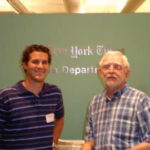Whitney Johnson left a seven figure Wall Street job in an effort to help women dream. Her BLOG, Dare to Dream, states: “women in the U.S. may be placated, even pampered, but because we aren’t dreaming, we are also desperate and depressed.” Whitney hopes to inspire other women to dream as big as she has. With a degree in music from Brigham Young University, Whitney moved, with her husband, to New York City, where she was promptly told she would be a good secretary. Whitney took the opportunity, but went back to school for accounting, and was soon placed on the administrative track on Wall Street.
Ten years later Whitney left Wall Street ranked among the best investors in the world. “Every time you make a big decision,” says Whitney, “there’s a push and a pull.” The push, she says, was reaching the ceiling of accomplishment in investing. The pull was turning forty, which she calls a “mid-life opportunity.”
Now, she counts blogging, publishing and managing a hedge fund among her pursuits. Organize Magizine, of which she is an investor and member of the advisory board, has a circulation of 100,000, and is available in many major retail outlets. Whitney’s advice for those pursuing their dreams is to simply “go out and try. Don’t be afraid. You have to be willing to take risks to dream.”
Interview: How I Became a Hedge Fund Manager
Sometimes things work and sometimes things don’t, but you still have to try. As you know, because you’re pursuing your passion.
At 22, I had just come home from a mission for my church. I had been in Uruguay for 18 months. I was still really in the middle of college. At that point, I wanted to be a musician, but I wasn’t sure.
I didn’t actually graduate from college until I was 27. If you can believe it. I majored in music and finished up college when I was 27. My husband and I moved to New York. I feel like I’m repeating this because you’ve heard this before. But anyhow, my husband was starting graduate school at Columbia. I needed to work to put him through school. So I said, “What can I do?” So I go out, interviewing for jobs, and they said, “Okay, let’s see. You have a music degree from a second tier school, Brigham Young University. And you’re female. You’ll make a great secretary.”
So that was basically my first job. I was working as a sales assistant for a retail broker at Smith Barney.
One of the things that happened to me as I got to New York and really started working, was that I said, “I’m working everyday. My husband is going to get his PhD. It’s going to take seven years, and that leaves me with another four years. So I can work and I can make “x.” Or I can make “10x.”” It was a pretty easy decision.
And then I started looking around me on Wall Street and said, “A lot of these people are smart, but I’m just as smart as they are.” So I started taking accounting courses at night. And then I got a break from a boss who wanted to put me on the professional track.
Often what happens when you’re an administrative assistant is they say there is an opportunity to move up, when there really isn’t. It means you’re “here” (making a ceiling with her hands), and there is no where to go.
But I had a boss that was willing to move me onto that track. And then I started working my way up the ladder. So that was over the course of ten years. When I left Wall Street two years ago, I had been an investment banker and was highly ranked, actually double ranked, in the institutional investor poll. And I was number one in media, number two in telecom and Latin America equity research at Merrill Lynch. So that was definitely a dream of mine was to do that.
And to really come from being this middle class kid out of a second tier college and going to be able to go after that. And really achieve it. That gave me this confidence that I, I can do this. I, I did these and I didn’t really have any special privileges other than being middle class.
That’s kind of your All-American story.
It is. It is. And what’s interesting about that story is that the first time I started to tell that story to someone, I was very cagey. I didn’t want to be evasive, but I didn’t know them to know that I started as a secretary. And so afterwards, a friend of a friend went back to my friend and said, “Why is she being so evasive. Why is she dodging our questions?” So my friend told these people the story and they said, “That’s a great story. Why is she embarrassed?” It took me awhile for me to be proud of what I accomplished because I thought it was better to come from a pedigree.
What led you to go into what you’re doing today?
Well, I think that whenever you make a big decision, to do something very different, there’s a push and a pull. The push for me was I had gotten to a point in my career where I had scaled the peak and felt like I had accomplished all I was going to accomplish. It was really diminishing returns from there, both financially, physically, etc. That was the push, it not being as fun as it was.
The pull was, I think part of it’s turning forty. Honestly. You get to this age where you start to say…sometimes people call it a mid-life crisis, but in fact, it’s a mid-life opportunity. Where you start reevaluating things. So I had a bunch of creative projects I wanted to work on, and none of those projects that I thought I was going to do at the time have yet worked. But, in the course of these two years I started doing the blog “Dare to Dream.”
One of the things I’ve really been focused on with women is “you have a dream.” It’s been primarily women because I’m a woman. And I get women more. But whatever it is, you have a dream and can figure out what it is.
What I do in my day job is I’m working on a hedge fund with a professor at Harvard Business School and his son, Clayton Christensen. He’s the author of The Innovator’s Dilemma. The idea behind this is that in any industry, if the incumbent, the major telecom company is doing everything right, they’re listening to all their best customers, they’ve got customers that they’re not listening to or don’t know about.
For instance, if you go to lots of emerging markets, you’ve got the incumbents with all the fixed line telethons. But the penetration in telephony was like, 10%. Which opened the door for wireless telephony. Which is much less expensive, and they could go after the 90% of the people that were using telethons. That was a disruption of the status quo.
We’re in the process of raising money. We’ve got about $25 million raised. We are starting to invest that money and looking to grow the fund to ideally, several hundred million dollars.
For me, it’s very thrilling to have spent those fifteen years pursuing a dream, gaining a lot of skills, but then being able to be in a position to say, you know, “I know that I can do others things. I want to try to do other things.” Shift gears. Take a couple years off and really be able to do whatever I wanted. And now, to go in a different direction and be more entrepreneurial.
What is a hedge fund?
(Smiles). You don’t know what a hedge fund is. Okay…Okay. I’m glad you asked me that question. Do you know what a mutual fund is?
Yes.
The only difference between a mutual fund and a hedge fund is that a mutual fund is regulated, and a hedge fund isn’t. The incentives are different. So in a mutual fund, you’ll pay 1% of the value of the assets back to the fund. Like Fidelity. In a hedge fund, 20% of the profits go to the managers. And there’s a 2% management fee. But, if you don’t perform, you get kicked out. You know, they fire you. So that’s the basic difference, is that the incentives are more aligned with the manager and the investors.
You said on your website that women don’t dare to dream these days.
Yeah. We may be pampered, even placated. But because we’re not dreaming we’re desperate and depressed.
Why don’t we dream then?
I think that’s a fair question, and let’s talk about people generally. You have to be willing to take risks to dream. When I left Wall Street, here I am, married with two young children. I’m making, basically a million dollars a year. And I’m saying, “I’m going to walk away.”
Now I had other people say to me, “I wish I could do what you are doing.” Well, the reality is that they could have. But, one the things you find when you’re making that leap to dream, as I’m sure you’ve saw, when you made this decision, is that you find out where people’s risk preferences are. You find out how risk averse people are. As they say things to you like, “Well, how could you sell your house?” Well, it’s just a house. Because I have a dream. The dream is more important to me than living in a big house.
I think one of the reasons why we don’t dream is that we don’t want to give up what we have currently. And I think we’re just scared. And sometimes I think people don’t know what their dream is.
But I really do believe it all goes back to this blog I wrote about my daughter and how she wanted to tie die her t-shirts. I was like, “Okay hunny. Well, we don’t have the dye. We don’t have the t-shirt. We don’t have this.” Five days later, we finally get to tie dying the t-shirt.
I realize that we as parents teach our children not to go after their dream. And they don’t internalize it as “Gee, mom and dad were really busy or tired.” They internalize it as somehow it’s about them, and them not dreaming. So I think that we as adults have to throw that off and get to the point where we have to say, “I have to dream. Because dreaming for me is like breathing air.”
Do you think that carries over to education as well?
One of the things that I am learning is that our parents do the best that they can. They’re doing what they think is the best for us. But they don’t know the best for us. We do. That’s the real key to growing up is being able to take what our parents taught us and sit through it, and sort through it, and be able to say, “Yeah I learned this. But actually the right path for me is this.” But that takes a lot of self trust and a lot of conviction. It can be really difficult to do. Especially when your parents are still paying some of your bills. It’s tough.
I think that’s where most people run into their problems. The money piece.
I certainly found a difference for me when I was financially independent from my parents. It was much easier for me to not listen to them as much. It just is. Because when you’re worried about having food on your table, it’s not quite so easy to dream.
That’s an argument we’ve come across in “pursuing a passion.” People say it’s reserved for the middle class or the upper class. They say it’s a thing for the privileged. Is there a socioeconomic aspect to it?
I do think there is, but I’m also a big believer in (long pause) that every person’s life is about their own trajectory. So you have a specific set of skills and talents and abilities. And you need to do as much as you possibly can with those. And once you’ve done that, or as you’re doing it, I would say, you’re in a position to give back. I think for us to hold ourselves back when someone else is struggling is defeating. Because the more knowledge I have, the more people I know, the more money I make, the better person I become, the more I’m able to impact and influence other people’s lives. And go do things microcredit. Things that really can lift people out of where they are.
What do you take away from Wall Street?
You know what I take away from Wall Street…is that…it is a really competitive place. When I first got there I thought I couldn’t compete. I think that having been there and being able to compete successfully gave me this great sense of confidence. Now whatever I pursue, I know I can do it. And that’s a really great thing to have.
Even though I know I can do things, I’ll talk to people who are younger who don’t know if they can do things. And I’ll look at them and say, “I know you can do it.” But they’re not sure if they can. I think there’s some real value when you throw yourself into a situation that’s highly competitive, not knowing that you can do it, and then walking through it, coming out on the other side, and saying, “I did it.” And then you know you can. And then it ends up impacting every other aspect of your life.
What’s the ratio of people working on Wall Street who are doing because they enjoy it, or are doing it because of the money?
I would say that there’s some type of curve there. When people start out, all of them really love it. I mean, it’s quite heady. It’s very fun. I would have days where I would upgrade or downgrade a stock as a research analyst and the stock would go up five percent. I mean, that’s a boost of adrenaline. You’re like, “Wow! The stock went up on my recommendation.”
But I do think that over time, the money becomes something that binds them to the job. Even when they may be ready to leave, because they have a mortgage they have to service, or a spouse, quite often a wife they are needing to attend to…their children in private schools, etc. That becomes so that they feel like they can’t.
So early on, most people love it, but when they’re ready to change, they may not necessarily do it.
Six out of ten women with children who work full-time would rather work part-time.
If you could go back to when you were 22 years old, what would you say to the 22 year old Whitney?
I’m just going to say what came to the top of my mind. Don’t be afraid. Don’t be afraid. Just go out and try! Don’t be afraid.






